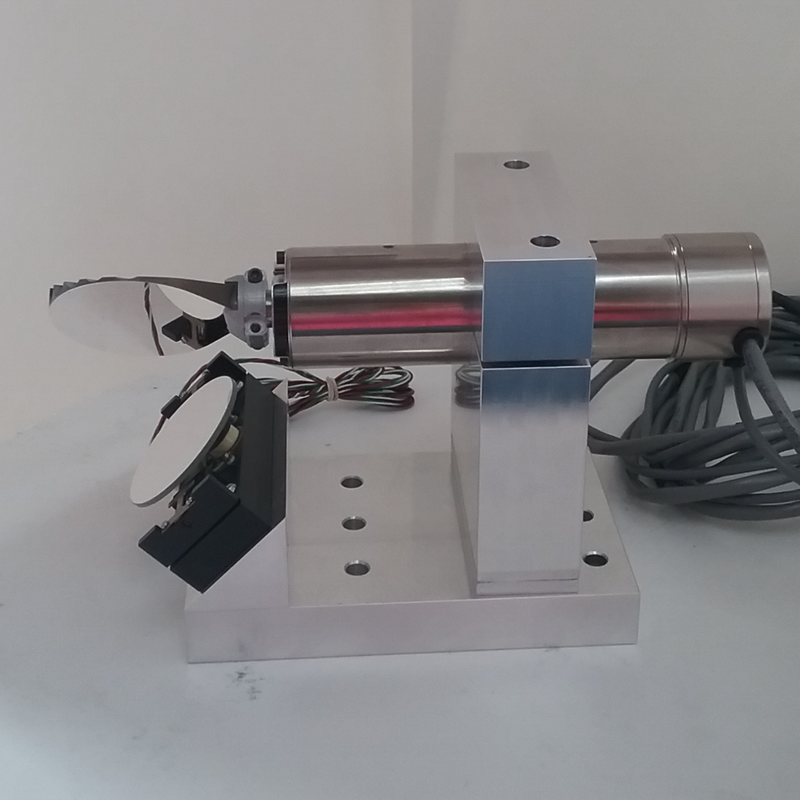The Value of Calibration in Optimizing Your Galvanometer Scanner's Performance
The Value of Calibration in Optimizing Your Galvanometer Scanner's Performance
Blog Article
How a Galvanometer Scanner Enhances Performance in Laser Scanning Technologies
The integration of galvanometer scanners in laser scanning technologies stands for a pivotal improvement in accuracy design. By helping with exact and rapid changes of laser beam direction, these tools substantially improve functional effectiveness across different applications, from medical imaging to industrial engraving. The underlying electro-magnetic devices, paired with innovative responses systems, guarantee real-time control and boosted accuracy. As markets increasingly require greater performance requirements, the inquiry arises: what future developments might even more elevate the capabilities of galvanometer scanners in this evolving landscape?
Recognizing Galvanometer Scanners
A galvanometer scanner is a sophisticated tool that leverages electromagnetic concepts to accomplish accurate angular activity of mirrors or other reflective surfaces. These scanners operate through the communication of an electric existing and a magnetic area, allowing fast and exact positioning. This technology is necessary in applications requiring high-speed scanning, such as laser engraving, optical interaction, and medical imaging.

Galvanometer scanners are frequently defined by their rapid feedback times and high angular resolution, making them perfect for applications that require fast movements and accurate placing. Their integrity and efficiency make them a crucial component in modern laser scanning technologies, contributing considerably to advancements in various fields, including manufacturing, medical care, and telecommunications.
System of Laser Beam Of Light Control

The control mechanism counts on closed-loop comments systems that continually monitor the beam of light's placement. The signals from optical sensors supply real-time information to the control system, enabling for quick changes to keep precision. This is vital in applications where also minor deviations can endanger the top quality of the check or etching.
Furthermore, the galvanometer's action time is paramount; high-speed motors enable speedy movements, making sure that the laser light beam can rapidly map complex patterns or carry out elaborate procedures. The integration of electronic signal handling even more boosts the responsiveness and precision of the galvanometer scanner. In general, the mechanism of laser light beam control with galvanometer scanners exemplifies the combination of advanced engineering and innovation, producing high-performance outcomes in laser scanning applications.
Advantages of Boosted Precision
Boosted precision in laser scanning modern technologies provides considerable benefits across various applications, from commercial production to clinical treatments. The assimilation visit our website of galvanometer scanners enables highly exact beam of light positioning, which is essential for jobs needing thorough detail. This boosted precision makes certain that the laser can target details locations with very little deviation, causing superior quality results.
In commercial contexts, precise laser scanning leads to enhanced product consistency and decreased product waste. In clinical applications, the precision of laser treatments can dramatically influence person end results.
Additionally, boosted precision helps with advanced applications such as 3D imaging and microfabrication, where even minute mistakes can lead to considerable mistakes. By supplying repeatable and trustworthy laser positioning, galvanometer scanners add to the general effectiveness and efficiency of laser systems. In recap, the advantages of improved accuracy not just improve functional performance but additionally elevate the criteria of top quality and safety and security in various industries.
Applications in Various Industries
The versatility of galvanometer scanners in laser scanning innovations expands throughout several industries, each gaining from the precision they supply. In the clinical area, these scanners are pivotal in applications such as laser surgical procedure and imaging, allowing for very precise targeting of tissues while decreasing damage to surrounding areas - galvanometer scanner. Their quick see post response and great resolution are crucial in producing high-grade results
In the manufacturing industry, galvanometer scanners boost processes like laser inscription and cutting. Their capability to swiftly guide laser beams onto surface areas makes it possible for reliable manufacturing lines, enhancing rate and accuracy in developing elaborate layouts or parts.
The vehicle industry also maximizes galvanometer technology for quality assurance and evaluations (galvanometer scanner). By using high-speed scanning, manufacturers can find issues in products or assemblies, making certain that products meet rigid standards
In addition, in the amusement market, galvanometer scanners are used in laser light shows and screens, supplying vibrant visual experiences with accurate control over laser motions.
Future Trends in Laser Scanning
Emerging technologies are poised to transform the landscape of laser scanning, with galvanometer scanners at the leading edge of this makeover. As markets progressively demand precision and performance, the evolution of galvanometer technology will drive considerable developments in laser scanning applications.
Future patterns suggest an expanding combination of artificial knowledge and machine understanding formulas, which will certainly boost data refining capacities and automate decision-making in real-time. This synergy will certainly enable a lot more advanced analysis of scanned data, resulting in boosted accuracy in applications such as 3D modeling and autonomous navigating.
Additionally, the miniaturization of components and the development of advanced materials will certainly add to lighter, much more portable laser scanning systems. This transportability will certainly expand the reach of laser scanning modern technologies into previously inaccessible atmospheres, such as remote surface and intricate architectural rooms.
The surge of enhanced reality (AR) and virtual fact (VIRTUAL REALITY) applications will certainly also shape the future of laser scanning. By combining galvanometer scanners with AR and virtual reality, individuals will profit from immersive experiences that improve visualization and project planning.
Verdict
In final thought, galvanometer scanners play a crucial function in optimizing laser scanning technologies with their accurate control of beam of light direction and fast angular changes. The integration of advanced feedback systems and optical sensors considerably enhances functional speed and accuracy, causing improved end results in applications such as laser inscription and clinical imaging. As sectors increasingly take on these innovations, the continuous innovations in galvanometer scanner styles are anticipated to further raise performance criteria and expand application possibilities.
The integration of galvanometer scanners in laser scanning modern technologies represents a crucial innovation in precision engineering. Overall, the mechanism of laser beam control via galvanometer scanners exhibits the fusion of innovative design and modern technology, generating high-performance outcomes in laser scanning applications.
By providing reputable and repeatable laser positioning, Visit This Link galvanometer scanners add to the overall performance and performance of laser systems.The flexibility of galvanometer scanners in laser scanning modern technologies expands across multiple markets, each benefiting from the precision they provide.In verdict, galvanometer scanners play a pivotal duty in enhancing laser scanning innovations via their precise control of beam instructions and fast angular adjustments.
Report this page